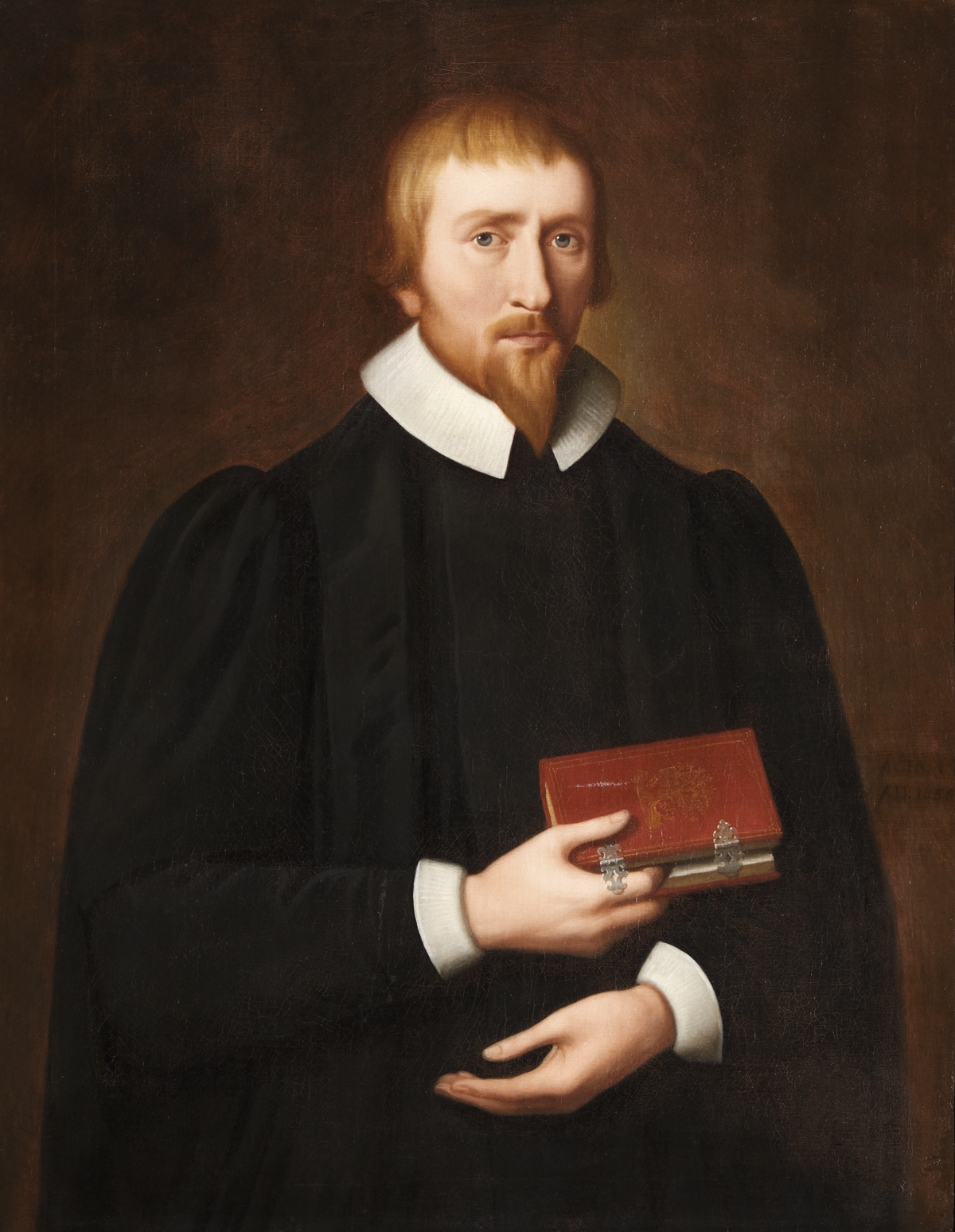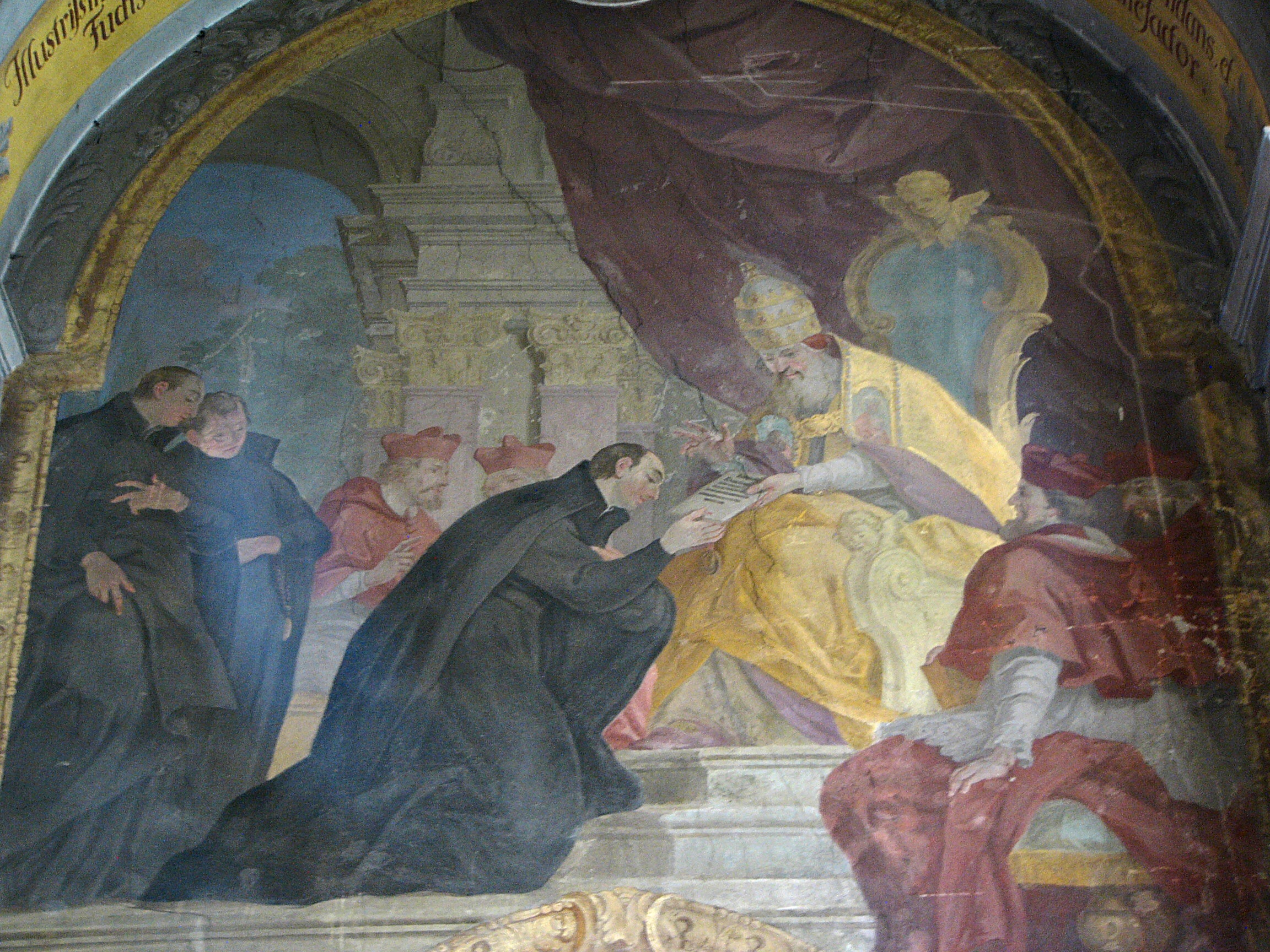|
Edward Knott
Edward Knott, real name Matthew Wilson (1582–1656) was an English Jesuit controversialist, twice provincial of the Society of Jesus in England. Life He was born at Catchburn in the parish of Morpeth, Northumberland, After studying humanities in the college of the English Jesuits at St. Omer. he was on 10 October 1602 admitted an alumnus of the English College at Rome, under the assumed same of Edward Knott, which he retained through life. He was ordained priest on 27 March 1606. He entered the Society of Jesus on 2 October the same year, and upon the expiration of his novitiate in 1608 he was appointed penitentiary in Rome. For some time he was prefect of studies in the English College. He was raised to the rank of a professed father of the Society of Jesus on 30 September 1618. During 1626 he was a missioner in the Suffolk district. He was apprehended in 1629, and was committed to the Clink prison in Southwark, but at the instance of queen Henrietta Maria's mother, Marie ... [...More Info...] [...Related Items...] OR: [Wikipedia] [Google] [Baidu] |
Jesuit
, image = Ihs-logo.svg , image_size = 175px , caption = ChristogramOfficial seal of the Jesuits , abbreviation = SJ , nickname = Jesuits , formation = , founders = , founding_location = , type = Order of clerics regular of pontifical right (for men) , headquarters = Generalate:Borgo S. Spirito 4, 00195 Roma-Prati, Italy , coords = , region_served = Worldwide , num_members = 14,839 members (includes 10,721 priests) as of 2020 , leader_title = Motto , leader_name = la, Ad Majorem Dei GloriamEnglish: ''For the Greater Glory of God'' , leader_title2 = Superior General , leader_name2 = Fr. Arturo Sosa, SJ , leader_title3 = Patron saints , leader_name3 = , leader_title4 = Ministry , leader_name4 = Missionary, educational, literary works , main_organ = La Civiltà Cattolica ... [...More Info...] [...Related Items...] OR: [Wikipedia] [Google] [Baidu] |
Christopher Potter
Christopher Potter (1591 – 3 March 1646) was an English academic and clergyman, Provost of The Queen's College, Oxford, controversialist and prominent supporter of William Laud. Life He was born in Westmoreland, the nephew of Barnaby Potter. He matriculated at Queen's on 11 July 1606, aged 15, having entered the college in the previous Easter term. He was elected taberdar (pauper puer) on 29 October 1609. He graduated B.A. on 30 April 1610 and M.A. on 8 July 1613, became chaplain on 5 July 1613, and fellow on 22 March 1614–15. He was magister puerorum in 1620, and senior bursar in 1622; graduated B.D. and received a preacher's licence on 9 March 1621, and proceeded D.D. on 17 February 1627. He was in early life a follower of Henry Airay, opponent of Laud, and held a lectureship at Abingdon where he was a popular preacher. On his uncle's resignation of the headship of Queen's (17 June 1626), he was elected Provost. He now attached himself to Laud, and was made chaplain in ... [...More Info...] [...Related Items...] OR: [Wikipedia] [Google] [Baidu] |
17th-century English Writers
The 17th century lasted from January 1, 1601 ( MDCI), to December 31, 1700 ( MDCC). It falls into the early modern period of Europe and in that continent (whose impact on the world was increasing) was characterized by the Baroque cultural movement, the latter part of the Spanish Golden Age, the Dutch Golden Age, the French ''Grand Siècle'' dominated by Louis XIV, the Scientific Revolution, the world's first public company and megacorporation known as the Dutch East India Company, and according to some historians, the General Crisis. From the mid-17th century, European politics were increasingly dominated by the Kingdom of France of Louis XIV, where royal power was solidified domestically in the civil war of the Fronde. The semi-feudal territorial French nobility was weakened and subjugated to the power of an absolute monarchy through the reinvention of the Palace of Versailles from a hunting lodge to a gilded prison, in which a greatly expanded royal court could be more easily k ... [...More Info...] [...Related Items...] OR: [Wikipedia] [Google] [Baidu] |
17th-century English Jesuits
The 17th century lasted from January 1, 1601 ( MDCI), to December 31, 1700 ( MDCC). It falls into the early modern period of Europe and in that continent (whose impact on the world was increasing) was characterized by the Baroque cultural movement, the latter part of the Spanish Golden Age, the Dutch Golden Age, the French ''Grand Siècle'' dominated by Louis XIV, the Scientific Revolution, the world's first public company and megacorporation known as the Dutch East India Company, and according to some historians, the General Crisis. From the mid-17th century, European politics were increasingly dominated by the Kingdom of France of Louis XIV, where royal power was solidified domestically in the civil war of the Fronde. The semi-feudal territorial French nobility was weakened and subjugated to the power of an absolute monarchy through the reinvention of the Palace of Versailles from a hunting lodge to a gilded prison, in which a greatly expanded royal court could be more easily k ... [...More Info...] [...Related Items...] OR: [Wikipedia] [Google] [Baidu] |
1656 Deaths
Events January–March * January 5 – The First War of Villmergen, a civil war in the Confederation of Switzerland pitting its Protestant and Roman Catholic cantons against each other, breaks out but is resolved by March 7. The Lutheran cantons of the larger cities of Zurich, Bern and Schaffhausen battle against seven Catholic cantons of Lucerne, Schwyz, Uri, Zug, Baden Unterwalden (now Obwalden and Nidwalden) and St. Gallen. * January 17 – The Treaty of Königsberg is signed, establishing an alliance between Charles X Gustav of Sweden and Frederick William, Elector of Brandenburg. * January 24 – The first Jewish doctor in the Thirteen Colonies of America, Jacob Lumbrozo, arrives in Maryland. * January 20 – Reinforced by soldiers dispatched by the Viceroy of Peru, Spanish Chilean troops defeat the indigenous Mapuche warriors in a battle at San Fabián de Conuco in what is now central Chile, turning the tide in the Spanish colonists favor in the ... [...More Info...] [...Related Items...] OR: [Wikipedia] [Google] [Baidu] |
1582 Births
Year 158 ( CLVIII) was a common year starting on Saturday (link will display the full calendar) of the Julian calendar. At the time, it was known as the Year of the Consulship of Tertullus and Sacerdos (or, less frequently, year 911 ''Ab urbe condita''). The denomination 158 for this year has been used since the early medieval period, when the Anno Domini calendar era became the prevalent method in Europe for naming years. Events By place Roman Empire * The earliest dated use of Sol Invictus, in a dedication from Rome. * A revolt against Roman rule in Dacia is crushed. China * Change of era name from ''Yongshou'' to ''Yangxi'' of the Chinese Han Dynasty. Births * Gaius Caesonius Macer Rufinianus, Roman politician (d. 237) Deaths * Wang Yi, Chinese librarian and poet (d. AD 89 AD 89 (LXXXIX) was a common year starting on Thursday (link will display the full calendar) of the Julian calendar. At the time, it was known as the Year of the Consulship of Fulvus an ... [...More Info...] [...Related Items...] OR: [Wikipedia] [Google] [Baidu] |
Richard Bradshaigh
Richard Bradshaigh or Bradshaw (alias ''Barton'', 1602–1669), was an English Jesuit. Biography Bradshaigh was born in Lancashire in 1602. He was educated in the English college at Rome and entered the Society of Jesus in 1625. Bradshaigh became a professed father in 1640 and rector of the English college at Liège in 1642. He was Provincial of the English province (1656–60) during the great political change in the collapse of the English Commonwealth and the restoration of the monarchy. He was rector of the English college at Saint-Omer Saint-Omer (; vls, Sint-Omaars) is a commune and sub-prefecture of the Pas-de-Calais department in France. It is west-northwest of Lille on the railway to Calais, and is located in the Artois province. The town is named after Saint Audomar, ... from 1660 till his death on 12 February 1669. Works Dodd ascribes to him a work on the ''Nullity of the Protestant Clergy'' in reply to Archbishop Bramhall, but the correctness of this statemen ... [...More Info...] [...Related Items...] OR: [Wikipedia] [Google] [Baidu] |
Francis Foster (Jesuit)
Francis or Frank Foster may refer to: Music * Frank Foster (jazz musician) (1928–2011), American jazz saxophonist * Frank Foster (country singer) (born 1982), American country singer-songwriter active since 2011 Politics * Frank Foster (Michigan politician) (born 1986), member of the Michigan House of Representatives in 2011–2014 * Frank Foster (Australian politician) (1872–1948) * Francis Foster (Tasmanian politician) (1888–1979) Sports * Francis Foster (cricketer, born 1761) (1761–1847), English cricketer * Francis Foster (cricketer, born 1848) (1848–1931), English cricketer * Frank Foster (cricketer) (1889–1958), English cricketer * Frank Foster (rugby league) (1940–2019), English rugby player and coach Others * Frank Hugh Foster (1851–1935), American clergyman of the Congregational church * Frank Keys Foster (1854–1909), American labor leader * Frank William Foster (1887–1963), British Royal Air Force officer * Frank Foster (''Coronation Street''), ... [...More Info...] [...Related Items...] OR: [Wikipedia] [Google] [Baidu] |
Henry Bedingfield(Jesuit)
Sir Henry Bedingfeld (1506–1583) was an English privy councillor and Vice-Chamberlain of the Household, MP for Norfolk and Suffolk. Henry Bedingfeld or Bedingfield may also refer to: * Henry Bedingfield (died 1657) (1586–1657), Member of Parliament (MP) for Norfolk 1614 *Henry Bedingfield (judge) (1632–1687), MP and judge *Sir Henry Bedingfeld, 1st Baronet (1614–1685) of the Bedingfeld Baronets *Sir Henry Bedingfeld, 2nd Baronet (1636–1704) of the Bedingfeld Baronets *Sir Henry Bedingfeld, 3rd Baronet (died 1760) of the Bedingfeld Baronets The Bedingfeld, later Paston-Bedingfeld Baronetcy, of Oxburgh in the County of Norfolk, is a title in the Baronetage of England. It was created on 2 January 1660 for Henry Bedingfeld, a cavalier, in recompense for his losses in the Royalist cau ... See also * Henry Paston-Bedingfeld (other) {{hndis, Bedingfeld, Henry ... [...More Info...] [...Related Items...] OR: [Wikipedia] [Google] [Baidu] |
Society Of Jesus
, image = Ihs-logo.svg , image_size = 175px , caption = ChristogramOfficial seal of the Jesuits , abbreviation = SJ , nickname = Jesuits , formation = , founders = , founding_location = , type = Order of clerics regular of pontifical right (for men) , headquarters = Generalate:Borgo S. Spirito 4, 00195 Roma-Prati, Italy , coords = , region_served = Worldwide , num_members = 14,839 members (includes 10,721 priests) as of 2020 , leader_title = Motto , leader_name = la, Ad Majorem Dei GloriamEnglish: ''For the Greater Glory of God'' , leader_title2 = Superior General , leader_name2 = Fr. Arturo Sosa, SJ , leader_title3 = Patron saints , leader_name3 = , leader_title4 = Ministry , leader_name4 = Missionary, educational, literary works , main_organ = La Civiltà Cattoli ... [...More Info...] [...Related Items...] OR: [Wikipedia] [Google] [Baidu] |
Jean Daillé
Jean Daillé ( Dallaeus) (6 January 1594–15 April 1670) was a French Huguenot minister and Biblical commentator. He is mentioned in James Aitken Wylie's ''History of Protestantism'' as author of an ''Apology for the French Reformed Churches''. Life He was born at Châtellerault and educated at Poitiers and Saumur. From 1612 to 1621 he was tutor to two of the grandsons of Philippe de Mornay, sieur du Plessis Marly. With his pupils he travelled to Italy in 1619, and met Paolo Sarpi in Venice. Ordained to the ministry in 1623, he was for some time private chaplain to Du Plessis Mornay, at La Forêt-sur-Sèvre, and subsequently worked on the ''Histoire de la vie de Messire Philippes de Mornay''. In 1625 Daillé was appointed minister of the church of Saumur, and in 1626 was chosen by the Paris Consistory (Protestantism), consistory to be minister of the church of Charenton-le-Pont, Charenton. On the moderate wing of the Calvinists, he was moderator at the Synod of Loudon. This was th ... [...More Info...] [...Related Items...] OR: [Wikipedia] [Google] [Baidu] |






